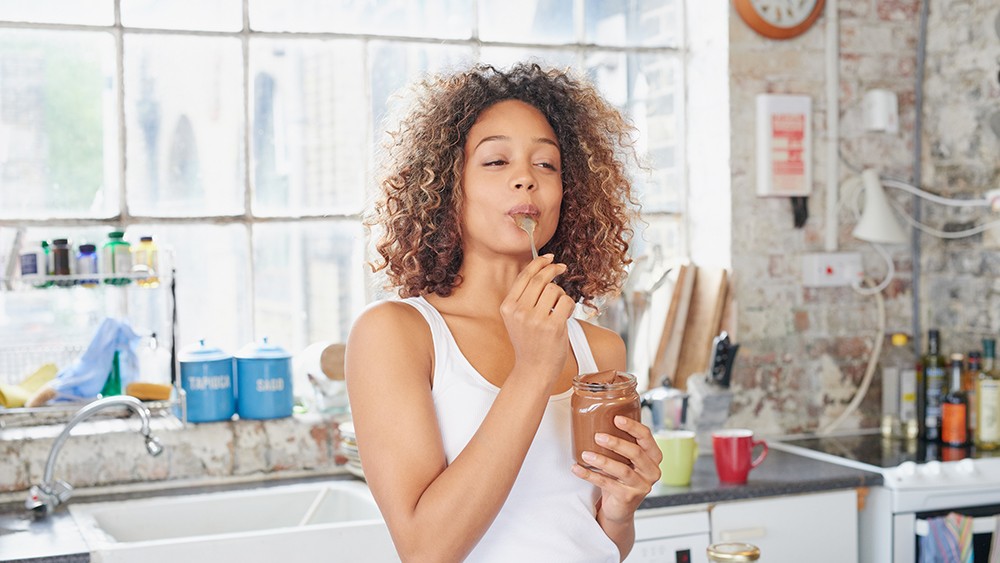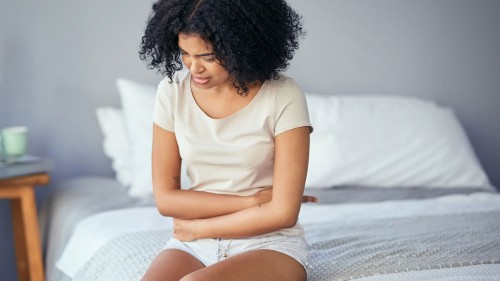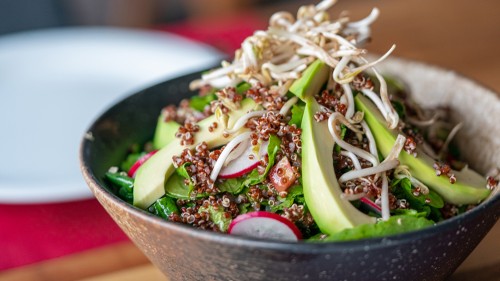A Dietitian Shares the Foods to Eat and Avoid on Your Period
Published on September 20, 2021
Medically Reviewed by Anthony Dugarte, MD
Your period may bring on an onslaught of symptoms linked to your fluctuating hormones, including cramps, mood swings, and fatigue. There are certain foods that can help ease your period symptoms and other foods that may aggravate them.


Your period can bring on a slew of uncomfortable symptoms. From mood swings to cramping, it can wreak havoc on your mind and body.
In fact, according to the Office on Women’s Health, 90% of women report experiencing various symptoms of PMS, including cramping, back pain, mood swings, fatigue, bloating, gastrointestinal upset, acne, and headaches. (1)
During your period, your cravings for sugary sweet or crunchy salty foods (or both) can be at an all-time high.
While it may be tempting to reach for the cookie or a bag of chips, you may be aggravating your period symptoms by throwing your hormones even further out of whack.
A well-balanced diet can support your fluctuating hormones and help with various period symptoms by restoring balance throughout your body.
Let’s take a deeper dive into what to eat while on your period, foods that help with cramps, and what not to eat during that time of the month.
10 Foods to Eat During Your Period
Below are some foods that have been shown to help keep severe menstrual symptoms at bay for some women and the reasons behind this.
1. Bananas
Bananas are an excellent food to eat while on your period because they’re a rich source of potassium.
You tend to retain more water during that time of the month, which can help contribute to the dreaded bloat.
The potassium content in bananas can help naturally restore the fluid balance in your body to help ease the bloating around your stomach.
Additionally, bananas provide a high dose of vitamin B6 and magnesium.
One small study found that supplemental vitamin B6 along with magnesium significantly reduced symptoms of PMS, including mood swings, irritability, and anxiety, over the course of one menstrual cycle. (2)
Bananas may also help reduce some of the common gastrointestinal symptoms associated with your period, including diarrhea and constipation. (3)
Not a fan of bananas? Try oranges, cantaloupe, or apricots, as these provide a rich source of potassium as well.
Summary
Bananas are a good period food as they are rich in potassium, which may help reduce bloating. They also provide vitamin B6, which has been shown to help reduce mood swings and irritability associated with PMS.
2. Salmon
If you’re wondering what foods to eat to help with period cramps, look no further than salmon.
Salmon is an omega-3 powerhouse, which can reduce inflammation, help to relax your muscles, and relieve period cramps.
One 2012 study analyzed the effects of omega-3 supplementation on the intensity of menstrual pain in women. (4)
Researchers found that the women who took omega-3 supplementation experienced a significant reduction in pain intensity and took fewer doses of ibuprofen to manage the pain versus those in the placebo group.
Salmon also provides vitamin D, another nutrient known to help alleviate PMS symptoms.
One 2018 study found that vitamin D supplementation helped reduce symptoms of PMS, including cramps and mood swings. (5)
If you don’t love salmon, you can get a nice dose of omega-3 from walnuts, avocado, and pumpkins too.
Summary
Salmon provides a rich source of omega-3’s which can help reduce inflammation and pain associated with cramps. Salmon also provides vitamin D, which may reduce several PMS symptoms.
3. Broccoli
Broccoli is loaded with various PMS-friendly nutrients, making it one of the best foods to eat during your period.
This powerhouse cruciferous veggie contains potassium and vitamin B6, both of which have been shown to reduce symptoms of PMS, including mood swings, irritability, and anxiety. (2)
Broccoli also contains calcium, which may play an important role in combating common PMS symptoms.
One 2017 study found that calcium supplementation can reduce PMS symptoms, including mood changes, depression, anxiety, and bloating. (6)
One 2016 study found that when combined with vitamin B6, calcium also appears to regulate mood and depressive symptoms associated with PMS. (7)
Summary
Broccoli is a good food to eat during your period because it contains potassium, vitamin B6, and calcium, all of which have been studied for their benefit in relieving common symptoms associated with PMS.
4. Dark Chocolate
Can dark chocolate really be a good food to eat on your period? And can it really help with period cramps?
Yes, and yes.
Dark chocolate provides a good source of magnesium, and according to a recent literature review, magnesium can reduce mood swings and help regulate serotonin, your happy hormone. (8)
Magnesium may help prevent period cramps in some women by relaxing the muscles of the uterus and by reducing the prostaglandins (chemicals in the lining of your uterus) that cause period pain.
To ensure you have an adequate amount of cacao (the nutrient-rich beans that make up chocolate), check to see the percentage.
Any chocolate made with 60% cacao or more will provide the health benefits of this delicious treat.
Summary
Dark chocolate provides a rich source of magnesium which has been shown to improve mood, reduce pain from cramps, and increase your serotonin levels.
5. Flaxseed
If you’re prone to heavy bleeding during your period, adding flaxseed to your diet may help.
According to currently available research, flaxseed may help to flush out excess estrogen that can contribute to clots and heavy bleeding. (9)
Flaxseed also provides a rich source of omega-3.
One older literature review found a positive link between omega-3 fatty acid supplementation and a reduction in period cramps. (10)
Ground flaxseed is easy to come by and mixes well in baked bread, yogurt, and your favorite smoothie recipe.
Summary
Flaxseed is a good food to eat during your period because it may help reduce heavy bleeding and alleviate pain from cramps due to its high omega-3 content.
6. Spinach
Are you feeling tired, achy, and dizzy during your period? These are symptoms that may be a sign of iron deficiency.
It’s common to have reduced iron levels during your period, particularly if you experience heavy flow.
Spinach is one of the best foods to eat while on your period because it provides a rich source of iron.
To help your body more easily absorb that iron, try pairing it with foods rich in vitamin C, like bell peppers or tomatoes.
Summary
Pairing spinach with a food high in vitamin C may help prevent iron deficiency during your period.
7. Avocados
Avocados make the list of best foods to eat while on your period because they are full of essential fatty acids, including oleic acid.
One older study assessed the effectiveness of essential fatty acids to treat PMS. (11)
Researchers found that women had reduced PMS symptoms when given a pill containing essential fatty acids, including oleic acid.
Avocados also contain period-friendly nutrients, including vitamin B6, vitamin C, and fiber.
Summary
Due to their oleic acid content, avocados may help reduce PMS symptoms.
8. Cashews
Cashews pack a powerful punch of both magnesium and iron.
Magnesium, along with vitamin B6, has been shown to reduce PMS symptoms. (12)
Blood loss during your period can lead to iron deficiency, making iron intake an important factor in easing some symptoms of PMS.
Summary
Cashews contain magnesium and iron, two nutrients that may help reduce some symptoms associated with PMS.
9. Water
Staying hydrated during your period is imperative, as a well-hydrated uterus tends to experience less cramping.
One 2021 study found that drinking 54 ounces to 68 ounces of water daily can alleviate pain, shorten the length of bleeding, and reduce the number of pain relievers taken during menstruation. (13)
Summary
Staying well hydrated can help reduce period pain and may even shorten the length of your period.
10. Yogurt
Yogurt is not only packed with calcium, but it also contains digestive-enhancing probiotics.
One 2017 study found that calcium intake was effective in reducing the intensity of menstrual pain. (14)
Additionally, the probiotics in yogurt can naturally help ease the digestive discomforts associated with your period, including diarrhea, constipation, and bloating.
Summary
Yogurt contains calcium, which has been shown to reduce menstrual pain.
5 Foods to Avoid While on Your Period
On the other hand, these are some foods you may want to minimize or exclude as not to amplify menstrual symptoms.
1. Caffeine
As tempting as it may be, especially when dealing with the sluggishness related to your period, try to avoid caffeine.
Unfortunately, caffeine can make your period pain that much worse.
One 2016 study showed that caffeine intake increased pain related to period cramps since caffeine makes blood vessels constrict, which can tighten the uterus. (15)
Caffeine can also promote dehydration which can worsen PMS symptoms.
A more soothing drink like ginger tea may be just what your body needs during this time of the month.
Research suggests that ginger may aid in digestion and reduce bloating. (16)
Summary
Try avoiding caffeine during your period as it can further constrict the blood vessels of your uterus, making period cramps worse. Drinking ginger tea may help in digestion and reduce bloating.
2. Sugary Foods
Cookies, brownies, donuts, cake, and pie all make the list of what not to eat while on your period.
These high sugar foods can spike your blood sugar, only to leave you crashing an hour or two later. This process can set the stage for a cycle of overwhelming fatigue.
Additionally, an excess of sugar can increase your cortisol levels (stress hormones), which can intensify those pesky mood swings.
Moreover, all those refined carbohydrates can contribute to an increase in bloating and constipation.
If you can’t ignore your cravings for a sweet treat, try a bit of high-quality dark chocolate, as it provides a host of period-friendly health benefits.
Summary
An excess sugar intake during your period can increase fatigue, mood swings, bloating, and constipation.
3. Carbonated Beverages
Carbonated drinks like soda and seltzer can make bloating even worse.
Try to drink water or decaffeinated teas, which can help to reduce water retention and minimize bloating.
Summary
Drinking carbonated drinks during your period may contribute to increased bloating.
4. Highly Processed Foods
Fries, chips, hot dogs, and pizza also make the list of what not to eat while on your period.
These highly processed foods are the most significant source of sodium in your diet.
According to one recent study, increased sodium intake may increase stomach bloating as well. (17)
Summary
Processed foods are loaded with sodium, which can increase bloating.
5. Alcohol
You may want to think again before reaching for another glass of wine to help ease your period symptoms.
Alcohol can worsen irritability, cause headaches, and exacerbate fatigue.
It can also cause dehydration, which can take your PMS symptoms up a notch.
Summary
Drinking alcoholic beverages may amplify tiredness, headaches, and irritability that can make your period less tolerable.
Related: Foods That Cause Inflammation
Other Ways to Support Hormone Balance During Your Period
There are also small lifestyle changes that can make a big difference in how you feel during that time of the month. Some of them may include:
-
Moving Your Body: Some light exercise or taking a walk can help reduce many uncomfortable symptoms related to your period. Exercise can give you a natural endorphin high, which may elevate your mood and make you feel more emotionally stable. Endorphins are also natural painkillers. When released during exercise, they help reduce the pain associated with period cramps and headaches.
-
Optimizing Your Sleep: Aim for 7 to 8 hours of sleep every night. This type of consistency can help stabilize your hormone levels, which can lead to fewer period symptoms.
-
Using a Heating Pad or Wrap: While certain foods help with period cramps, there are also other natural ways to help reduce pain. A heating pad or wrap can reduce pain by relaxing the muscles and increasing blood flow directly to the uterus.
-
Eating Smaller, More Frequent Meals: Nibbling throughout the day can help optimize your blood sugars to help keep your energy levels and mood stable.
The Bottom Line
If you struggle with PMS, painful periods, or other symptoms of hormonal imbalance, you are not alone.
Since the beginning of time, women endured hormonal fluctuations brought on by their period and all of the uncomfortable symptoms that follow.
Thankfully, there are many good foods to eat during your period, in addition to foods that help with cramps.
The best-period foods are rich in nutrients, provide fiber, and are not highly processed.
It is pretty common for women to crave “junk food” during their period, and sometimes giving in to that craving is fine.
However, it’s important to try and make the connection between eating healthier foods and supporting hormone balance, as symptoms of PMS are often an indication of hormonal imbalance.
At WellnessVerge, we only use reputable sources, including peer-reviewed medical journals and well-respected academic institutions.
- Office on Women's Health: Premenstrual syndrome (PMS):
https://www.womenshealth.gov/menstrual-cycle/premenstrual-syndrome - A synergistic effect of a daily supplement for 1 month of 200 mg magnesium plus 50 mg vitamin B6 for the relief of anxiety-related premenstrual symptoms: a randomized, double-blind, crossover study:
https://pubmed.ncbi.nlm.nih.gov/10746516/ - Bananas, a source of compounds with health properties:
https://www.researchgate.net/publication/284276760_Bananas_a_source_of_compounds_with_health_properties - Effect of omega-3 fatty acids on intensity of primary dysmenorrhea:
https://pubmed.ncbi.nlm.nih.gov/22261128/ - High dose vitamin D supplementation can improve menstrual problems, dysmenorrhea, and premenstrual syndrome in adolescents:
https://pubmed.ncbi.nlm.nih.gov/29447494/ - Effect of calcium on premenstrual syndrome: A double-blind randomized clinical trial:
https://www.ncbi.nlm.nih.gov/pmc/articles/PMC5313351/ - Effect of Combined Use of Calcium and Vitamin B6 on Premenstrual Syndrome Symptoms: a Randomized Clinical Trial:
https://pubmed.ncbi.nlm.nih.gov/26989667/ - Magnesium in the gynecological practice: a literature review:
https://pubmed.ncbi.nlm.nih.gov/28392498/ - Menorrhagia: A synopsis of management focusing on herbal and nutritional supplements, and chiropractic.:
https://www.ncbi.nlm.nih.gov/pmc/articles/PMC2077876/ - Endometriosis, dysmenorrhea and diet--what is the evidence?:
https://pubmed.ncbi.nlm.nih.gov/17210218/ - Essential fatty acids for premenstrual syndrome and their effect on prolactin and total cholesterol levels: a randomized, double blind, placebo-controlled study:
https://reproductive-health-journal.biomedcentral.com/articles/10.1186/1742-4755-8-2 - Evaluating the effect of magnesium and magnesium plus vitamin B6 supplement on the severity of premenstrual syndrome:
https://www.ncbi.nlm.nih.gov/pmc/articles/PMC3208934/ - The role of water intake in the severity of pain and menstrual distress among females suffering from primary dysmenorrhea: a semi-experimental study:
https://bmcwomenshealth.biomedcentral.com/articles/10.1186/s12905-021-01184-w - Effects of Calcium-Vitamin D and Calcium-Alone on Pain Intensity and Menstrual Blood Loss in Women with Primary Dysmenorrhea: A Randomized Controlled Trial:
https://academic.oup.com/painmedicine/article/18/1/3/2924701 - Major dietary patterns in relation to menstrual pain: a nested case control study:
https://www.ncbi.nlm.nih.gov/pmc/articles/PMC5963185/ - Why is ginger good for you?:
https://www.medicalnewstoday.com/articles/265990#benefits - Effects of the DASH Diet and Sodium Intake on Bloating: Results From the DASH-Sodium Trial:
https://pubmed.ncbi.nlm.nih.gov/31206400/






